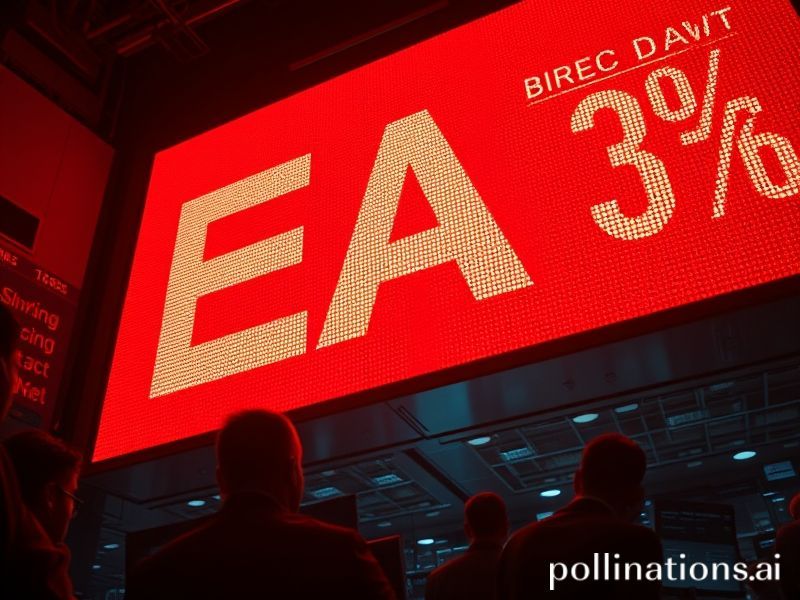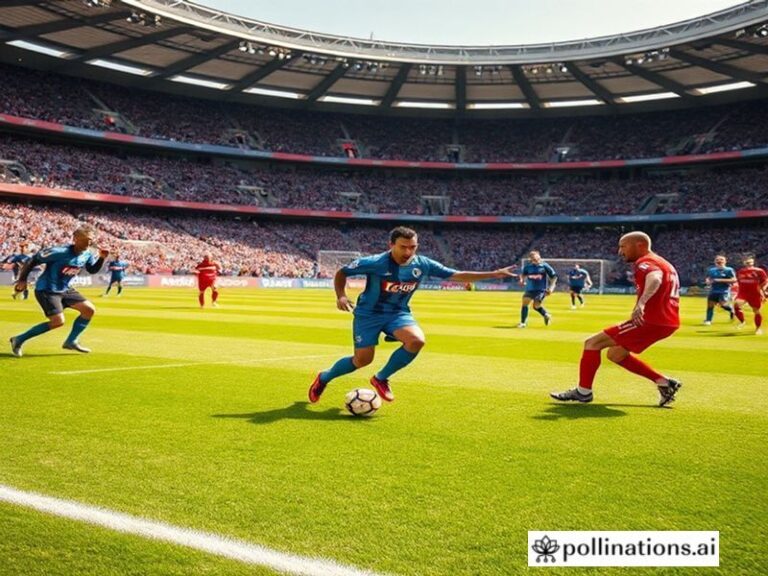EA Stock Surges on Worldwide Willingness to Pay for Make-Believe: A Global Loot-Box Love Story
Electronic Arts, the Redwood City outfit whose logo once resembled a blade of grass trying to look intimidating, has spent the last year convincing global investors that loot boxes are not, in fact, a form of taxable gambling. The campaign has worked modestly well: EA’s share price is up roughly 40 % since January, a rally that—depending on your time zone—looks like either a triumph of digital monetisation or the final proof that late-stage capitalism has discovered respawn mechanics.
From Seoul’s neon arcades to São Paulo’s favela LAN cafés, the numbers roll in. FIFA Ultimate Team—essentially Panini stickers with a banking license—now generates more annual revenue than the entire Greek football league. Asian analysts, sipping cold brew in glass towers where the air is filtered twice before it reaches human lungs, call this “recurring user investment.” European regulators, chewing antacids in drafty Brussels offices, call it “a problem we’ll schedule for 2027.” EA simply calls it Tuesday.
The stock chart resembles a heartbeat monitor attached to a teenager who’s just spotted a rare skin drop. Each quarterly beat is followed by the ritual incantations: net bookings, live services, engagement hours. Investors from Toronto to Tel Aviv nod solemnly, as though these phrases contain any more meaning than the Latin mass. The truth is simpler: EA has perfected the art of selling hope in 12-second bursts, then charging rent on the disappointment.
China provides the most exquisite irony. After regulators limited minors to three hours of online gaming per week, EA simply pivoted to selling cosmetics to their parents. The same Party officials who once denounced “spiritual opium” now preside over a system where Aunt Chen drops ¥299 on a neon-blue Kylian Mbappé so her nephew can flex on classmates he is legally forbidden to play with. Somewhere, a Politburo member’s portfolio quietly thanks her.
Meanwhile, the Global South clocks in as the new frontier. Nigerian gamers tethering to generator power still find coins for Apex Legends battle passes; Indian students on patchy 4G grind Madden NFL despite never having seen a real American football. EA’s CFO, speaking from a climate-controlled earnings call, praises “untapped ARPU” (average revenue per user). Translation: the planet still has wallets we haven’t vacuumed.
Environmentalists will appreciate the efficiency: one digital stadium can host every match on Earth without watering a single blade of grass. Critics counter that the energy powering those servers still melts polar ice faster than a speed-runner exploiting a glitch. EA’s sustainability report counters with a pledge to be “net-zero on scope 2 emissions by 2050,” a date so distant that most of its current player base will be either retired or underwater.
Currency swings add extra spice. When the Turkish lira imploded, EA simply repriced points packages overnight—same dopamine, cheaper for anyone earning euros. Argentinian gamers, veterans of economic quick-save scumming, treat each Steam sale like a UN humanitarian drop. EA’s regional pricing team must feel like foreign-exchange students assigned to write a thesis on “fun” while the dorm is on fire.
And yet, the share price keeps drifting upward, a hot-air balloon stitched from microtransactions and the collective delusion that tomorrow’s teenagers will care about the same pixelated footballers. Analysts issue bullish notes, conveniently ignoring that every bull market eventually meets its own final boss—whether called regulation, demographics, or the simple human fatigue of being nickel-and-dimed by an algorithm wearing cleats.
In the end, EA’s stock is less a bet on video games than on humanity’s endless capacity to pay for the illusion of progress. The ledger says it’s working. The rest of us, queued up for the next limited-time pack, can only admire the craftsmanship while quietly calculating how many hours of our lives we’ve already traded for a purple rarity badge. Respawn in three… two… one.







